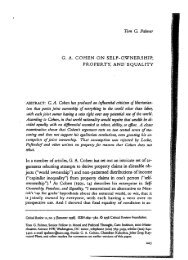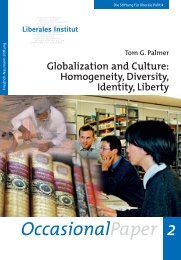Are Patents and Copyrights Morally Justified? - Tom G. Palmer
Are Patents and Copyrights Morally Justified? - Tom G. Palmer
Are Patents and Copyrights Morally Justified? - Tom G. Palmer
You also want an ePaper? Increase the reach of your titles
YUMPU automatically turns print PDFs into web optimized ePapers that Google loves.
~3bb I-IarvardJournal of Law C~PublIc Polwy [Vol. l~<br />
The arguments of Locke <strong>and</strong> von Humboldt on the importance<br />
of ownership rights in ourselves <strong>and</strong> in tangible objects<br />
have already been discussed, so there is no need to review them<br />
further. What I do propose, however, is 1) that such rights have<br />
their foundation in nature <strong>and</strong> can without confusion be called<br />
natural rights, even though they emerge through a historical<br />
process <strong>and</strong> necessarily contain an element of the conventional<br />
<strong>and</strong> contingent (nature revealing itself through history); <strong>and</strong> 2)<br />
that self-ownership rights are consistent with justice-as-order<br />
(as discussed in the section on the structure ofutilitarian arguments<br />
above).<br />
The role played by scarcity in self-ownership theories is central,<br />
for the most obviously scarce of all physical resources is<br />
one’s own body. Ifjustice has any meaning at all, it refers at<br />
least to the allocation ofvarious rights to control physical resources.<br />
Such a system ofjustice can emerge from a flow of<br />
historical events by an “invisible h<strong>and</strong>” process, without diminishing<br />
its “naturalness.” As Hume remarks, “Tho’ the rules of<br />
justice be artificial, they are not arbitrary. Nor is the expression<br />
improper to call them Laws of Nature; if by natural we underst<strong>and</strong><br />
what is common to any species, or even if we confine it to<br />
mean what is inseparable from the species.” 144 To say that a<br />
law is natural is not, however, to affirm that it is self-evident, or<br />
even that a sufficiently powerful deductive mind could arrive at<br />
it. As Hume remarks, “Nor is the rule concerning the stability<br />
of possessions the less deriv’d from human conventions, that it<br />
arises gradually, <strong>and</strong> acquires force by a slow progression, <strong>and</strong><br />
by our repeated experience of the inconveniences of transgressing<br />
it.” 45 Practice, in social experience as well as personal,<br />
plays a significant factor in the formation of ethics.<br />
(“Ethics” is, after all, but a transliteration of the Greek word<br />
perhaps best translated as “habit,” that is, what is formed<br />
through practice.)<br />
The fundamental question of who should have the right to<br />
control one’s body <strong>and</strong>, by implication, the products of one’s<br />
labor, is, in many respects, a problem ofcoordination. It is a<br />
problem of arriving at a stable equilibrium solution in a<br />
“game” that has no unique stable solution. Our bodies could be<br />
considered the property ofthe king; some class of people could<br />
144. D. HUME. supra note 131, at 484.<br />
145. Id. at 490.











